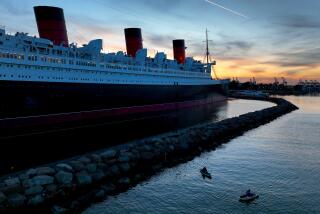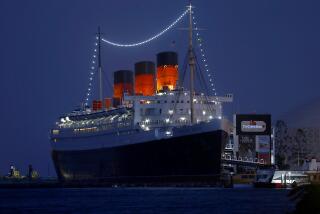Ships’ Housing Deal Is Under Scrutiny
- Share via
WASHINGTON — When Carnival Cruise Lines agreed to lease three ships to the government for Hurricane Katrina evacuees, the company president portrayed it as an act of compassion to “provide desperately needed housing for thousands of individuals.” Now two lawmakers are questioning the hastily negotiated deal, which could give the company as much as $236 million.
Rep. Henry A. Waxman (D-Los Angeles) sent a letter Friday to Homeland Security Secretary Michael Chertoff requesting a copy of the contract and documentation supporting its cost. Rep. Marilyn N. Musgrave (R-Colo.) said she intended to ask for an investigation of the Sept. 2 deal.
“In emergencies, strange things happen, but this raises a lot of red flags,” Musgrave said. “We need to shine some light on this and see if the deal was proper.”
Said Waxman: “We seem to be paying a heck of a lot of money for these ships. I’m trying to determine if this is a wise use of resources.”
Carnival says it will earn no more on the deal than it would have received if the three vessels had remained in regular service.
But the pact, made by the Navy’s Military Sealift Command at the direction of the Federal Emergency Management Agency, has raised questions about whether the payments are excessive.
Neither Carnival nor the government will release details about how they arrived at the contract numbers.
The deal calls for Carnival to be paid $192 million for providing about 7,100 berths, originally intended for evacuees but now being used mostly for emergency workers, for six months. Carnival is also being reimbursed for up to $44 million in operating costs, including charges assessed at ports for fuel, water, electricity and waste disposal.
In addition, Carnival’s contract includes compensation to the company for corporate taxes that experts say could amount to tens of millions of dollars.
The government agreed to this because Carnival, though based in Miami, is exempt from U.S. income taxes and some other taxes because it is registered in Panama, its ships fly foreign flags and the vessels operate primarily in international waters.
The trade association that represents cruise lines is seeking a Treasury Department waiver to exempt vessels under government contract from federal corporate income taxes and withholding taxes for crews.
Carnival has said that if the waiver is approved, it will reduce the amount of its contract payment.
Navy Capt. Joseph Manna, who negotiated the contract at the Military Sealift Command, said nothing was inappropriate about the process or outcome. The Carnival deal was comparable to the cost of “a hotel and three meals a day,” he said, which is “in a reasonable area of price.”
But, he added, if he’d had more time “I might have been able to get a better price.... When you do it fast, sometimes you pay a little more.”
The Military Sealift Command is primarily charged with arranging for private shipping companies to transport fuel and cargo to war zones. Spokeswoman Trish Larson said that “Carnival determined the price for use of their ships” under a competitive bidding process.
She said the command routinely reimbursed the port expenses included in Carnival’s contract.
A Canadian company that is providing a fourth ship under the same contract is also being reimbursed for its expenses.
Less Than Half Capacity
“The deal is designed so that Carnival does not make any money beyond what it would have made if these ships had been kept in service,” said Carnival spokeswoman Jennifer de la Cruz.
She said the company was being reimbursed for “any costs incurred in excess of our normal vessel operating costs.”
But she added that the company might be willing to change the terms of the deal.
“The pricing was calculated based on the best information available to us in the short period of time we were given to negotiate the preliminary terms of the charters,” De La Cruz said.
“Since cruise ships have never been deployed under these circumstances, many assumptions and estimates were made as to the extra costs, cost savings, possible taxes and revenues lost in connection with this operation. Subsequent events and the true experience following a period of operation of the vessels may result in adjustments to the charter hire price.”
Carnival put the deal together in 36 hours and was forced to cancel about 100,000 customers’ cruises, De La Cruz said.
The company’s decision to make its vessels available amid a national crisis was “a huge public relations risk” and “a significant disruption to our business operations,” she said.
Originally, as FEMA scrambled to catch up with the unfolding disaster in New Orleans and neighboring areas, it came up with the idea of leasing passenger ships as emergency housing for evacuees.
After those fleeing the hurricane objected to being sheltered on the water and isolated from services they needed to get back on their feet, FEMA decided to use two of Carnival’s ships for police, firefighters, and other emergency and relief workers.
The third Carnival vessel, based in Mobile, Ala., is being used to house evacuees from Mississippi.
The Canadian ship, an overnight ferry now moored outside New Orleans in Chalmette, La., is also housing relief workers.
Relief workers and others began to use the ships Sept. 12. The delay was due to “getting the ships in port,” FEMA spokesman James McIntyre said.
None are close to capacity. As of Wednesday, the Ecstasy had 1,359 on board; the Sensation, 1,388; the Holiday, 220; and the Scotia Prince, the Canadian vessel, 331.
Under the contract, Carnival is receiving $424,000 a day for 2,634 berths on the Sensation, a cruise ship based in Galveston, Texas; $383,000 for 2,634 berths on the Ecstasy, which was moved to New Orleans; and $263,000 for 1,848 berths on the Holiday in Mobile, Ala. This includes quarters, three meals daily and housekeeping services.
Those numbers amount to an average berth cost of $27,000 for six months. If Carnival is reimbursed the full $44 million allowed for expenses, the average will exceed $33,000.
McIntyre said FEMA expected to fill all the available berths.
In his letter to Chertoff, Waxman said: “Many of the berths are going unfilled, which could make the costs per person extraordinarily high.” Even if all were used, he said, the cost “would appear to be far more than other options, such as providing community-based housing.”
Waxman, the ranking Democrat on the Government Reform Committee, requested copies of all contracts with Carnival as well as documents used to calculate the costs and solicit bids.
Musgrave said in an interview that she was concerned about the size of the Carnival contract, the reimbursements for expenses and the request for a tax waiver. She said she intended to ask the Bush administration and congressional leaders to open an investigation into the contract next week.
Only the bids submitted by Carnival and the Canadian company for their ships met the conditions FEMA set in the competitive process, according to the Military Sealift Command.
Without details on how Carnival, FEMA and the Military Sealift Command arrived at their deal, industry insiders say, it is difficult to say how much money Carnival will make on the deal.
Reaction in the Industry
Industry insiders were split on whether Carnival would come out ahead.
Joyce Landry, chief executive of Landry & Kling, the Florida-based ship-chartering firm that recommended the Canadian ship to FEMA, said Carnival would probably not fare better than it otherwise would have. “When all is said and done, I wonder if they’re going to lose money here,” she said.
But a cruise industry consultant, who declined to be identified because he works with the industry, said of the reimbursements for operating expenses: “In normal commercial operations, there is no fairy godmother that pays these expenses. You pay them out of your pocket.”
The consultant, and several other industry experts interviewed by The Times, also noted that the three ships Carnival chartered to the government are among the smallest, oldest and least luxurious in its fleet, and offer passengers lower-end rates.
J. Michael Crye, the president of International Council of Cruise Lines, a trade organization that includes Carnival, said the council was seeking waivers from the Treasury Department to exempt cruise lines from taxes while aiding Katrina victims. The council is also requesting that Homeland Security exempt the companies from some visa requirements for its workers, who do not require U.S. work visas while operating in international waters.
“If you treat these as international voyages and therefore U.S. corporate income taxes would not apply for the charters, then the cost would be reduced by that amount,” Crye said.
He said he did not know the amounts involved.
Carnival, the Military Sealift Command and Treasury declined to disclose them.
Of the request for a tax waiver, Treasury spokesman Taylor Griffin said: “We’re considering it.”
Times researcher Janet Lundblad in Los Angeles contributed to this report.
More to Read
Sign up for The Wild
We’ll help you find the best places to hike, bike and run, as well as the perfect silent spots for meditation and yoga.
You may occasionally receive promotional content from the Los Angeles Times.






